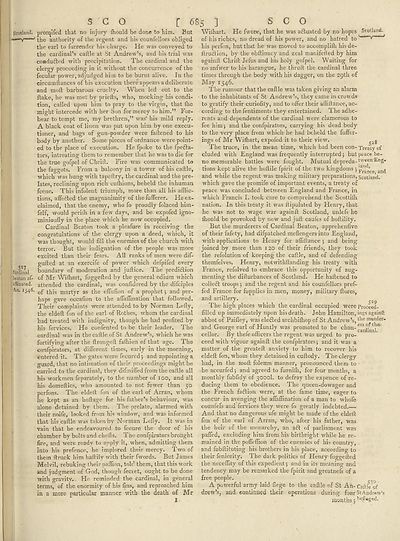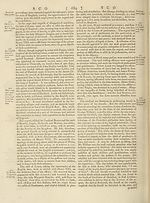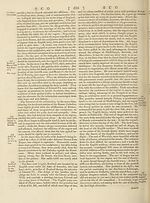Encyclopaedia Britannica, or, a Dictionary of arts, sciences, and miscellaneous literature : enlarged and improved. Illustrated with nearly six hundred engravings > Volume 18, RHI-SCR
(723) Page 685
Download files
Complete book:
Individual page:
Thumbnail gallery: Grid view | List view

sco r 6s5 ] sco
Scotland, prorrjifed that no injury (hould be done to him. But
’V""’"'' the authority of the regent and his counfellors obliged
the earl to furrender his charge. He was conveyed to
the cardinal’s caftle at St Andrew’s, and his trial was
conducted with precipitation. The cardinal and the
clergy proceeding in it without the concurrence of the
fecular power, adjudged him to be burnt alive. In the
circutnflances of his execution there appears a deliberate
and moft barbarous cruelty. When led out to the
flake, he was met by priefts, who, mocking his condi¬
tion, called upon him to pray to the virgin, that the
might intercede with her Son for mercy to him.” For¬
bear to tempt me, my brethren,” was* his mild reply.
A black coat of linen was put upon him by one execu¬
tioner, and bags of gun-powder were faftened to his
body by another. Some pieces of ordnance were point¬
ed to the place of execution. He fpoke to the fpefta-
tors, intreating them to remember that he was to die for
the true gofpel of Chrift. Fire was communicated to
the faggots. From a balcony in a tower of his cattle,
which was hung with tapeftry, the cardinal and the pre¬
lates, reclining upon rich cufhions, beheld the inhuman
fcene. This infolent triumph, more than all his afflic¬
tions, affe&ed the magnanimity of the fufferer. He ex¬
claimed, that the enemy, who fo proudly folaced him-
felf, would perith in a few days, and be expofed igno-
minioufly in the place which he now occupied.
Cardinal Beaton took a pleafure in receiving the
congratulations of the clergy upon a deed, which, it
was thought, would fill the enemies of the church with
terror. But the indignation of the people was more
excited than their fears. All ranks of men were dif-
gutted at an exercife of power which defpifed every
Cardinal boundary of moderation and juftice. The predi&ion
heaton af- of Mr Wifliart, fuggefted by the general odium which
iffinated. attended the cardinal, was confidered by the difciples
1 A.n, 1545. 0£ j-jjig martyr as the effufion of a prophet j and per¬
haps gave occafion to the aflaflination that followed.
Their complaints were attended to by Norman Lefly,
the eldeft fon of the earl of Rothes, whom the cardinal
had treated with indignity, though he had profited by
his fervices. He confented to be their leader. The
cardinal was in the caftle of St Andrew’s, which he was
fortifying after the ftrongeft faihion of that age. The
confpirators, at different times, early in the morning,
entered it. The gates were fecured 5 and appointing a
guard, that no intimation of their proceedings might be
carried to the cardinal, they difmiffed from the caftle all
his workmen feparately, to the number of 100, and all
his domeftics, who amounted to not fewer than 50
perfons. The eldeft fon of the earl of Arran, whom
lie kept as an hoftage for his father’s behaviour, was
alone detained by them. The prelate, alarmed with
their noife, looked from his window, and was informed
that his caftle was taken by Norman Lefly. It was in
vain that he endeavoured to fecure the door of his
chamber by bolts and chefts. The confpirators brought
fire, and were ready to apply it, when, admitting them
into his prefence, he implored their mercy. Two of
them ftruck him haftily with their fwords. But James
Melvil, rebuking their paflion, told them, that this work
and judgment of God, though feciet, ought to be done
with gravity.. He reminded the cardinal, in general
terms, of the enormity of his fins, and reproached him
in a more particular manner with the death of Mr
l
Wifhart. He fwore, that he was afluated by no hopes Scotland..
of his riches, no dread of his power, and no hatred to 1-"" 'v
his perfon, but that he was moved to accomplifh his de-
ilruclion, by the obftinacy and zeal manifefted by him
againft Chrift Jefus and his holy gofpel. Waiting for
no anfwer to his harangue, he thruft the cardinal three
times through the body with his dagger, on the 29th of
May 1546.
The rumour that the caftle was taken giving an alarm
to the inhabitants of St Andrew’s, they came in crowds
to gratify their curiofity, and to offer their afliftance, ac¬
cording to the fentiments they entertained. The adhe¬
rents and dependents of the cardinal were clamorous to
fee him; and the confpirators, carrying his dead body
to the very place from which he had beheld the fuffer-
ings of Mr Wifhart, expofed it to their view.
The truce, in the mean time, which had been con-Treaty of
eluded with England was frequently interrupted; but peace be-
no memorable battles were fought. Mutual depreda-tw^en
tions kept alive the hoftile fpirit of the two kingdoms ; an(j
and while the regent was making military preparations, 5^1^.
which gave the promife of important events, a treaty of
peace was concluded between England and France, in
which Francis I. took care to comprehend the Scottiili
nation. In this treaty it was ftipulated by Henry, that
he was not to wage war againft Scotland, unlefs he
fliould be provoked by new and juft caufes of hoftility.
But the murderers of Cardinal Beaton, apprehenfive
of their fafety, had difpatched meflengers into England,
with applications to Henry for afliftance ; and being
joined by more than 120 of their friends, they took
the refolution of keeping the caftle, and of defending
themfelves. Henry, notwithftanding his treaty with
France, refolved to embrace this opportunity of aug¬
menting the difturbances of Scotland. He haftened to
colleft troops; and the regent and his counfellors pref-
fed France for fupplies in men, money, military ftores,
and artillery. ^
The high places which the cardinal occupied were Proceed-
filled up immediately upon his death. John Hamilton, ings againft
abbot of Paifley, was elected archbifhop of St Andrew’s, t^e mvrder-
and George earl of Huntly was promoted to be chan-
cellor. By thefe officers the regent was urged to pro¬
ceed with vigour againft: the confpirators; and it was a
matter of the greateft anxiety to him to recover his
eldeft fon, whom they detained in cuftody. The clergy
had, in the moft folemn manner, pronounced them to
be accurfed; and agreed to furnifh, for four months, a
monthly fubfidy of 3000I. to defray the expence of re¬
ducing them to obedience. The queen-dowager and
the French faflion were, at the fame time, eager to
concur in avenging the aflaflination of a man to whofe
counlels and fervices they were fo greatly indebted.—
And that no dangerous ufe might be made of the eldeft:
fon of the earl of Arran, who, after his father, was
the heir of the monarchy, an aft of parliament was
palTed, excluding him from his birthright while he re¬
mained in the poffeflion of the enemies of his country,
and fubftituting his brothers in his place, according to
their feniority. The dark politics of Henry fuggefted
the neceflity of this expedient; and in its meaning and
tendency may be remarked the fpirit and greatnefs of a
free people.
A powerful army laid flege to the caftle of St An- Caftle'of
drew’s, and continued their operations during four St Andrew’s
months; hcf‘ig<rd-
Scotland, prorrjifed that no injury (hould be done to him. But
’V""’"'' the authority of the regent and his counfellors obliged
the earl to furrender his charge. He was conveyed to
the cardinal’s caftle at St Andrew’s, and his trial was
conducted with precipitation. The cardinal and the
clergy proceeding in it without the concurrence of the
fecular power, adjudged him to be burnt alive. In the
circutnflances of his execution there appears a deliberate
and moft barbarous cruelty. When led out to the
flake, he was met by priefts, who, mocking his condi¬
tion, called upon him to pray to the virgin, that the
might intercede with her Son for mercy to him.” For¬
bear to tempt me, my brethren,” was* his mild reply.
A black coat of linen was put upon him by one execu¬
tioner, and bags of gun-powder were faftened to his
body by another. Some pieces of ordnance were point¬
ed to the place of execution. He fpoke to the fpefta-
tors, intreating them to remember that he was to die for
the true gofpel of Chrift. Fire was communicated to
the faggots. From a balcony in a tower of his cattle,
which was hung with tapeftry, the cardinal and the pre¬
lates, reclining upon rich cufhions, beheld the inhuman
fcene. This infolent triumph, more than all his afflic¬
tions, affe&ed the magnanimity of the fufferer. He ex¬
claimed, that the enemy, who fo proudly folaced him-
felf, would perith in a few days, and be expofed igno-
minioufly in the place which he now occupied.
Cardinal Beaton took a pleafure in receiving the
congratulations of the clergy upon a deed, which, it
was thought, would fill the enemies of the church with
terror. But the indignation of the people was more
excited than their fears. All ranks of men were dif-
gutted at an exercife of power which defpifed every
Cardinal boundary of moderation and juftice. The predi&ion
heaton af- of Mr Wifliart, fuggefted by the general odium which
iffinated. attended the cardinal, was confidered by the difciples
1 A.n, 1545. 0£ j-jjig martyr as the effufion of a prophet j and per¬
haps gave occafion to the aflaflination that followed.
Their complaints were attended to by Norman Lefly,
the eldeft fon of the earl of Rothes, whom the cardinal
had treated with indignity, though he had profited by
his fervices. He confented to be their leader. The
cardinal was in the caftle of St Andrew’s, which he was
fortifying after the ftrongeft faihion of that age. The
confpirators, at different times, early in the morning,
entered it. The gates were fecured 5 and appointing a
guard, that no intimation of their proceedings might be
carried to the cardinal, they difmiffed from the caftle all
his workmen feparately, to the number of 100, and all
his domeftics, who amounted to not fewer than 50
perfons. The eldeft fon of the earl of Arran, whom
lie kept as an hoftage for his father’s behaviour, was
alone detained by them. The prelate, alarmed with
their noife, looked from his window, and was informed
that his caftle was taken by Norman Lefly. It was in
vain that he endeavoured to fecure the door of his
chamber by bolts and chefts. The confpirators brought
fire, and were ready to apply it, when, admitting them
into his prefence, he implored their mercy. Two of
them ftruck him haftily with their fwords. But James
Melvil, rebuking their paflion, told them, that this work
and judgment of God, though feciet, ought to be done
with gravity.. He reminded the cardinal, in general
terms, of the enormity of his fins, and reproached him
in a more particular manner with the death of Mr
l
Wifhart. He fwore, that he was afluated by no hopes Scotland..
of his riches, no dread of his power, and no hatred to 1-"" 'v
his perfon, but that he was moved to accomplifh his de-
ilruclion, by the obftinacy and zeal manifefted by him
againft Chrift Jefus and his holy gofpel. Waiting for
no anfwer to his harangue, he thruft the cardinal three
times through the body with his dagger, on the 29th of
May 1546.
The rumour that the caftle was taken giving an alarm
to the inhabitants of St Andrew’s, they came in crowds
to gratify their curiofity, and to offer their afliftance, ac¬
cording to the fentiments they entertained. The adhe¬
rents and dependents of the cardinal were clamorous to
fee him; and the confpirators, carrying his dead body
to the very place from which he had beheld the fuffer-
ings of Mr Wifhart, expofed it to their view.
The truce, in the mean time, which had been con-Treaty of
eluded with England was frequently interrupted; but peace be-
no memorable battles were fought. Mutual depreda-tw^en
tions kept alive the hoftile fpirit of the two kingdoms ; an(j
and while the regent was making military preparations, 5^1^.
which gave the promife of important events, a treaty of
peace was concluded between England and France, in
which Francis I. took care to comprehend the Scottiili
nation. In this treaty it was ftipulated by Henry, that
he was not to wage war againft Scotland, unlefs he
fliould be provoked by new and juft caufes of hoftility.
But the murderers of Cardinal Beaton, apprehenfive
of their fafety, had difpatched meflengers into England,
with applications to Henry for afliftance ; and being
joined by more than 120 of their friends, they took
the refolution of keeping the caftle, and of defending
themfelves. Henry, notwithftanding his treaty with
France, refolved to embrace this opportunity of aug¬
menting the difturbances of Scotland. He haftened to
colleft troops; and the regent and his counfellors pref-
fed France for fupplies in men, money, military ftores,
and artillery. ^
The high places which the cardinal occupied were Proceed-
filled up immediately upon his death. John Hamilton, ings againft
abbot of Paifley, was elected archbifhop of St Andrew’s, t^e mvrder-
and George earl of Huntly was promoted to be chan-
cellor. By thefe officers the regent was urged to pro¬
ceed with vigour againft: the confpirators; and it was a
matter of the greateft anxiety to him to recover his
eldeft fon, whom they detained in cuftody. The clergy
had, in the moft folemn manner, pronounced them to
be accurfed; and agreed to furnifh, for four months, a
monthly fubfidy of 3000I. to defray the expence of re¬
ducing them to obedience. The queen-dowager and
the French faflion were, at the fame time, eager to
concur in avenging the aflaflination of a man to whofe
counlels and fervices they were fo greatly indebted.—
And that no dangerous ufe might be made of the eldeft:
fon of the earl of Arran, who, after his father, was
the heir of the monarchy, an aft of parliament was
palTed, excluding him from his birthright while he re¬
mained in the poffeflion of the enemies of his country,
and fubftituting his brothers in his place, according to
their feniority. The dark politics of Henry fuggefted
the neceflity of this expedient; and in its meaning and
tendency may be remarked the fpirit and greatnefs of a
free people.
A powerful army laid flege to the caftle of St An- Caftle'of
drew’s, and continued their operations during four St Andrew’s
months; hcf‘ig<rd-
Set display mode to:
![]() Universal Viewer |
Universal Viewer | ![]() Mirador |
Large image | Transcription
Mirador |
Large image | Transcription
Images and transcriptions on this page, including medium image downloads, may be used under the Creative Commons Attribution 4.0 International Licence unless otherwise stated. ![]()
| Permanent URL | https://digital.nls.uk/193028106 |
|---|
| Attribution and copyright: |
|
|---|
| Description | Ten editions of 'Encyclopaedia Britannica', issued from 1768-1903, in 231 volumes. Originally issued in 100 weekly parts (3 volumes) between 1768 and 1771 by publishers: Colin Macfarquhar and Andrew Bell (Edinburgh); editor: William Smellie: engraver: Andrew Bell. Expanded editions in the 19th century featured more volumes and contributions from leading experts in their fields. Managed and published in Edinburgh up to the 9th edition (25 volumes, from 1875-1889); the 10th edition (1902-1903) re-issued the 9th edition, with 11 supplementary volumes. |
|---|---|
| Additional NLS resources: |
|

